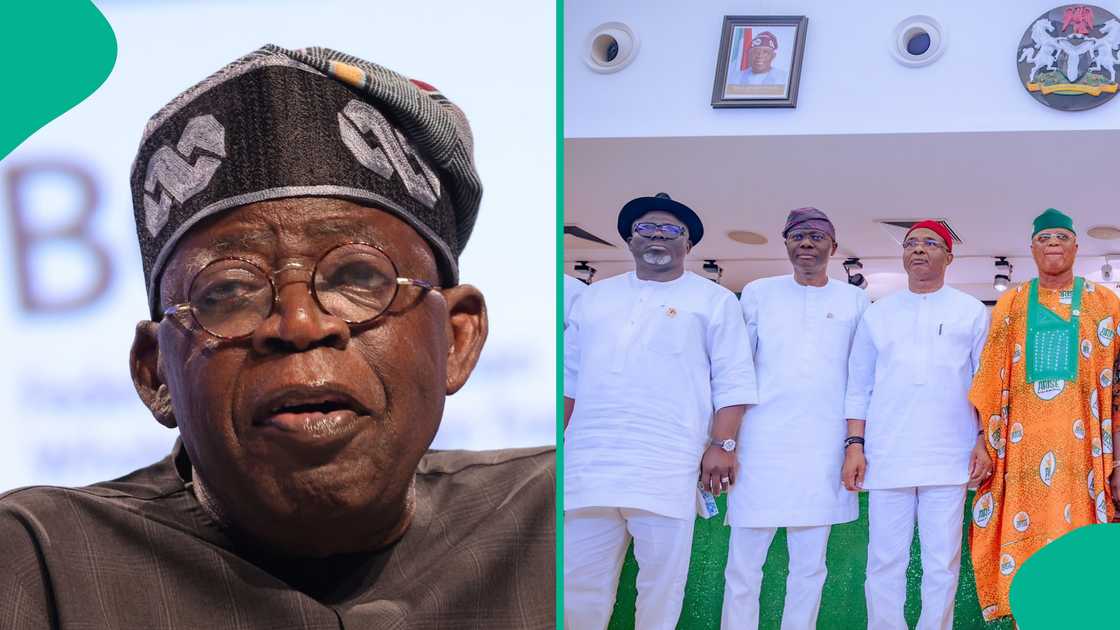Six APC Governors Reportedly Funding Coalition Talks Secretly
- ADP chieftain Dr Sani Dawop stated that six APC governors were secretly funding coalition talks, sparking speculation about Nigeria’s political landscape
- The formation echoed past political realignments, with internal dissatisfaction in the ruling party fuelling strategic moves behind the scenes
- As discussions intensify, observers have been closely watching whether these coalition efforts would reshape the country’s evolving electoral dynamics
In an interview with Daily Trust on 9 June, coalition insider and Action Democratic Party (ADP) chieftain, Dr Sani Dawop, claimed that six governors from the ruling All Progressives Congress (APC) were actively financing coalition discussions.
According to Dr Dawop, financial backing from these governors mirrored the political manoeuvres that led to the formation of the APC years prior.

Source: Twitter
He highlighted the involvement of dissatisfied elements within the ruling party who sought an alternative political alignment.
“There are about six APC governors funding the coalition right now. Go and check and go and do your investigation. It was exactly what happened when APC was formed. Many governors left the PDP and joined the APC in 2015,” he stated.
Dr Dawop: strategy and internal APC discontent
Dr. Dawop emphasised that coalition-building was a legitimate political strategy, adding that internal dissatisfaction within the APC was contributing to these developments.
“In a political formation, you are free to have interests. It is part of the strategy in politics; you don’t reveal your arsenal very early. Even within the APC, there are those who are not happy with the present administration,” he remarked.
He further spoke on the importance of inclusive democratic processes, urging for fairness in electoral contests, including the right of politicians to challenge the incumbent president.
“The government is expected to provide a level playing field. People should be allowed to contest with the president. When Tinubu became president, he contested with other people. There should be a level playing field,” Dr. Dawop asserted.
Coalition's implications for Nigeria’s political landscape
The claims of APC governors allegedly bankrolling coalition talks signals possible shifts in Nigeria’s political dynamics ahead of future elections.
Political analysts have suggested that internal divisions within the ruling party could influence upcoming electoral strategies and future realignments.
Observers are monitoring how the coalition efforts unfold and if this leads to a formidable political movement capable of challenging the status quo.
The video of Dr Dawop's interview is below:
What is a coalition in politics?
By definition, coalition talks refer to discussions among political groups aimed at forming alliances to achieve shared objectives.
These negotiations often involve key stakeholders, including party leaders and influential figures, working to unify their efforts ahead of elections or major political shifts.
In Nigeria, recent coalition talks have gained attention, especially with claims that six APC governors are financially backing the process, potentially reshaping the country's political landscape.
Coalition leak, defections threaten democracy — Analyst
Reacting, public policy analyst, Daniel Akinlami, described the alleged secret coalition as a move that may backfire politically and erode democratic values in Nigeria.
“If at all there was something like that genuinely being planned, it's out of place for that person to even spill it out. It has already sabotaged that plan,” he said during an interview with Legit.ng.
Akinlami noted that Nigeria's political space is increasingly tilting toward a one-party state, describing the wave of defections from the opposition to the ruling party as alarming.
“We cannot rule out such a thing in this country today. The way all the governors and the party leaders in the opposition are decamping to APC is very disturbing.”
“It's like the country is going towards a one-party state. And we have never seen it this bad.”
He drew historical parallels to previous political transitions, noting that while defections have occurred in every election cycle since the ex-president Olusegun Obasanjo era, the scale and frequency under the current administration are unprecedented.
Akinlami said the absence of a strong opposition is unhealthy for democracy.
“As it is now, it continues to become worrisome that there is no opposition. Almost everybody in the main opposition party (PDP), is jumping out to go to APC. You see them every day. Every one of them is welcome in Aso Rock.”
Akinlami argued that while coalition-building is a political reality, the optics of mass defections undermine public trust:
“The images we are seeing with this decamping does not inspire or encourage democracy.”
Mass defections may backfire on APC, Akinlami warns
He also warned the APC to be cautious, citing past betrayals within party ranks during the 2015 elections.
“When Jonathan was in power, as at the time he was coming out to run for election in 2015, 22 governors were backing him, but, at the end of the election, he still lost. There are reports that many of them who were PDP governors worked against Jonathan.”
Akinlami warned the APC could face a similar fate:
“If the APC is not careful, this whole drama that is going on now, what they are celebrating as decampment and people leaving PDP to join them, may eventually work against them when the election comes.”
He cautioned that political betrayal could emerge from within.
“The betrayal that will shock most people will spring up within the APC, because now you can see that practically PDP is empty. You don't know who is who in the APC.”
“Even within the southwest of APC, within Tinubu’s bloc, you don't even know who is on Tinubu's side right now.”
He referenced lingering tensions in Lagos and Osun states:
“There has been speculation that Sanwo-Olu was fingered in working codedly for opposition in 2023, though it hasn’t been ascertained yet… you can see what is happening in Osun state with Aregbesola. He is not hiding where he stays.”
He concluded by critiquing the ideological vacuum in Nigerian politics.
“In fact, you cannot really say the Nigerian political system has left or right because all the ideologies are similar. There is even no ideology, no political ideology… The central issue you can see right now is the fact that a lot of people are driven by self-interest. It's a few days to the election that you begin to see the sabotage happen.”
Prophet makes prediction ahead of 2027 election
Legit.ng also previously reported that amid coalition rumours, pastor Major Prophet warned that in future, political parties would attempt to buy religious endorsements, influencing the nation's clergy in unprecedented new ways.
He claimed that politicians would seek to sway religious leaders, turning places of worship into platforms for endorsements. He described a scenario where they would publicly declare support for candidates for incentives.
Editorial assistant Ololade Olatimehin provided exclusive commentary from a public policy analyst for this report.
PAY ATTENTION: Сheck out news that is picked exactly for YOU ➡️ find the “Recommended for you” block on the home page and enjoy!
Proofreading by Bruce Douglas, copy editor at Legit.ng.
Source: Legit.ng


